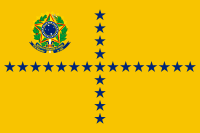José Alencar
| His Excellency José Alencar | |
|---|---|
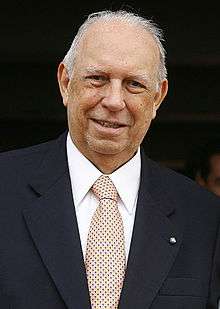 | |
| 23rd Vice President of Brazil | |
|
In office January 1, 2003 – January 1, 2011 | |
| President | Luiz Inácio Lula da Silva |
| Preceded by | Marco Maciel |
| Succeeded by | Michel Temer |
| Minister of Defence | |
|
In office November 8, 2004 – March 31, 2006 | |
| President | Luiz Inácio Lula da Silva |
| Preceded by | José Viegas Filho |
| Succeeded by | Waldir Pires |
| Senator for Minas Gerais | |
|
In office February 1, 1999 – December 15, 2002 | |
| Personal details | |
| Born |
José Alencar Gomes da Silva October 17, 1931 Muriaé, Brazil |
| Died |
March 29, 2011 (aged 79) São Paulo, Brazil |
| Political party |
PMDB (1993–2002) PL (2002–2005) PRB (2005–2011) |
| Spouse(s) |
Mariza Oliveira Campos (m. 1957) |
| Children |
Maria da Graça Patrícia Josué |
| Residence | Jaburu Palace (2003–2011) |
| Occupation | Businessman • politician |
José Alencar Gomes da Silva (Portuguese pronunciation: [ʒuˈzɛ ɐlẽˈkaʁ ˈɡõmiz dɐ ˈsiɫvɐ]; October 17, 1931 – March 29, 2011) was a Brazilian businessman and politician who served as the Vice President of Brazil from January 1, 2003 to January 1, 2011. In business from a young age, Alencar became a self-made multimillionaire as the chief executive of Coteminas, a leading textile manufacturer. In the 1990s, Alencar groomed his son to succeed him at the company.
He opted to enter politics in his home state, Minas Gerais.[1] Alencar had a business-oriented political platform, advocating market liberalization and deregulation of production. His expensive political campaigns received hefty funds from Coteminas. After a failed run in 1994 for governor of Minas Gerais, he won the election in 1998 as Senator representing his home state.
In 2002, Alencar was invited by the left-wing Workers' Party to run for Vice President on the same ticket as Luiz Inácio Lula da Silva. The alliance between the leftist union leader and Alencar, an experienced entrepreneur, proved successful. They won the presidential elections in 2002 and were re-elected in 2006. Over the years, Lula da Silva and Alencar developed a close and affectionate friendship. Diagnosed with cancer of the stomach and kidney in 1997, Alencar died of the disease in 2011.
Alencar came to be revered among journalists and politicians for his spirited personality and friendly demeanor. He overcame his lack of formal education. Based on his business success, he argued in favor of lower taxes, especially indirect taxation over consumers, and a simpler tax system; lower interest rates and greater oversight of the banking industry; and social welfare and assistance programs. As Vice President, Alencar sometimes spoke out against his own government's orthodox policies, causing embarrassment for fellow administration members.[2] His unwavering determination to live in the face of terminal cancer also marked public perception, during and after his time in office.
Personal life and early political career
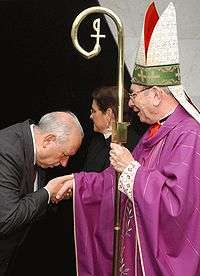
Alencar was born into a family of small entrepreneurs from Muriaé, in the inland state of Minas Gerais on October 17, 1931. He was the eleventh son of Antônio Gomes da Silva and Dolores Peres Gomes da Silva. As a child, he was a Boy Scout.
He started working while still a child, dropping out of primary school to help his father in the family business. He worked with his older brothers for years before becoming an independent successful businessman.[3] For a time he worked as a travelling salesman and in food wholesale start-ups.
Marriage and family
After getting established, Alencar married Mariza Gomes in 1957. They had three children together. Their two daughters are Maria da Graça and Patrícia. Their son Josué took over the presidency of Coteminas after his father went into politics.
As a result of a case filed by Rosemary de Morais, a 55-year-old retired teacher, in July 2010 the court ruled that Alencar needed to recognize her as his daughter. (The case may be appealed.)[4][5] He had refused to undergo DNA testing but, according to Brazilian law 12.004/2009,[6] this refusal is accepted as evidence of paternity. In addition, the judge ruled that other evidence in the case led him to his decision.[7] Rosemary de Morais said she was the child of Francisca de Morais, a nurse, and Alencar, from a relationship they had in 1954, before either was married.[4] The legal case over Morais' parentage is still ongoing, as there are some appeal rights.
Career
Alencar eventually turned his family's small clothes factory and retail store into a major business. In 1967, he founded Coteminas, which he would lead to become one of Brazil's largest textile manufacturers.[8] He produced goods for traditional brands in its portfolio, such as Artex, Santista and Calfat. He vied for dominance of the global market after a merger with South Carolina-based Springs Industries.
After decades as a businessman, Alencar decided to enter politics and prepared his son to take over his leadership of Coteminas. He ran for governor of Minas Gerais in 1994. Although he was not successful, in 1998 he was elected as Senator from Minas Gerais. While in the Senate, Alencar worked on several Commissions, including the Senatorial Commission for Economic and Social Matters.
In 2002, he left the presidency of his company, by then a leading player with roughly 850 million reais in yearly net sales, to his son Josué Gomes da Silva. Alencar ran for Vice President of Brazil, tapped to be Lula's running mate, to assuage worries about the candidate's alleged anti-business bias.[9][10] He became the honorary President of the center-right Liberal Party.
At the end of 2005, Alencar left his party to associate with the new Brazilian Republican Party, whose founders included Bishop Marcelo Crivella of the Universal Church of the Kingdom of God, a large and growing evangelical church in Brazil and other countries.[8] Crivella is also a Senator representing Rio de Janeiro in the federal government.
Vice Presidency (2003-2010)
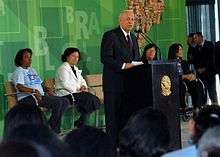
In office, Alencar aligned with another successful businessman in the cabinet, Luiz Fernando Furlan, to channel the demands of Brazilian businessmen. They voiced discontent with bureaucracy, insufficient infrastructure and cautious monetary policy. His efforts led to the strengthening of Apex-Brasil, a pro-export agency seen as instrumental in the Brazilian economy's recent rise in exports.[11]
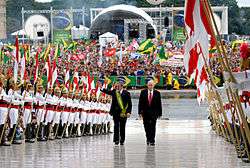
Alencar was the most notable person in government to openly complain of the conservative monetary policies of the Brazilian Central Bank, under Henrique Meirelles, backed by ministers Antonio Palocci and Paulo Bernardo. He often criticized his own administration for failing to lower the Central Bank's base interest rates and demanded a reform of the country's tax system.
In November 2004 he was sworn in as Defense Minister, following the resignation of José Viegas Filho. Lula turned to him to occupy the position. Alencar tried to resign on several occasions, claiming that a businessman would hardly be the best choice for running a nation's military forces. President Lula convinced him to stay until March 2006, when Alencar resigned his ministerial post, in favor of anti-graft activist Waldir Pires.[12][13]
Despite his disagreements with some policies of the Lula administration, Alencar was officially invited by Lula to be his running mate in the 2006 general elections. With Lula's re-election victory on October 29, Alencar secured his position as Vice President for another term. Alencar adopted a lower tone, while still espousing his traditional positions. He sought to run for the Senate in 2010, but was forced to give up due to the advanced stage of his cancer disease.
Disease and death
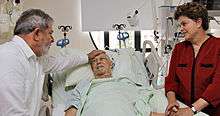
On a routine check-up, José Alencar was diagnosed with stomach and kidney cancer in 1997. After undergoing treatment for some length of time, he had his right kidney and two-thirds of his stomach surgically removed. Five years later, a malignant tumor in his prostate was removed. As the disease had metastasized, it continued to spread, and in 2006 doctors discovered a sarcoma in his abdomen. On January 26, 2009, a surgery extirpated eight tumors, along with compromised portions of his small and large intestines and the ureters.

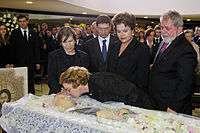
He was treated for digestive hemorrhage in December 2010 with urgent surgery, his last as Vice President. Doctors could not remove the tumors in his abdomen because of the number of operations to which he had already been subjected – eighteen in all. Alencar received chemotherapy for many years. He was mostly treated at Hospital Sírio-Libanês, in São Paulo. He also received experimental treatment at the M.D. Anderson Cancer Center in Houston, Texas.[14][15][16]
Alencar died in late March 2011, in the city of São Paulo, after 13 years battling metastasized cancer.[17] His death was met with expressions of grief and respect by members of different institutions and across the political spectrum[18] – former President Lula said he knew "few men with José Alencar's goodness and spirit"[19] and President Rousseff said it was an "honor" to have served alongside him.[20] Brazil held a state funeral for José Alencar, and Vice President Michel Temer decreed seven days of official mourning.[21] Alencar is remembered as an honest and independent politician who favored social welfare and economic freedom.[12]
References
- ↑ "Fundada por Alencar, Coteminas é uma das maiores empresas têxteis do país" (in Portuguese). Folha de S. Paulo. July 23, 2010. Retrieved March 29, 2011.
- ↑ Maurício Lima (May 28, 2003). "O vice que ruge" (in Portuguese). Veja. Retrieved March 31, 2011.
- ↑ , Escoteiros
- 1 2 Marcelo Portela (July 22, 2010). "Justiça determina que vice-presidente José Alencar reconheça paternidade" (in Portuguese). O Globo. Retrieved March 29, 2011.
- ↑ "Juiz determina que Alencar reconheça filha de 55 anos (Justice rules that Alencar recognize his daughter of 55 years)" (in Portuguese). O Dia. 23 July 2010. Archived from the original on 26 July 2010. Retrieved 29 March 2011.
- ↑ Tarso Genro (July 29, 2009). "LEI Nº 12.004, DE 29 DE JULHO DE 2009" (in Portuguese). President of Brazil. Retrieved April 16, 2011.
- ↑ "Lula sanciona lei de presunção de paternidade. Recusa em fazer DNA se torna prova" (in Portuguese). O Globo. July 30, 2009. Retrieved April 16, 2011.
- 1 2 "Dono da Coteminas, Alencar ajudou Lula a superar resistência do empresariado" (in Portuguese). Universo Online. March 29, 2011. Retrieved March 29, 2011.
- ↑ Larissa Santana (7 August 2008). "Ele não está mais sozinho" (in Portuguese). Exame. Archived from the original on 19 July 2011. Retrieved 29 March 2011.
- ↑ "Coteminas Investor Relations". Coteminas. Retrieved March 29, 2011.
- ↑ Juan Quirós (March 30, 2011). "A despedida do guerreiro" (in Portuguese). Diário de S. Paulo. Retrieved March 31, 2011.
- 1 2 Giancarlo Lepiani (March 31, 2006). "Alencar, crítico da política econômica de Lula e empresário de sucesso" (in Portuguese). O Globo. Retrieved March 29, 2011.
- ↑ Giancarlo Lepiani (March 31, 2006). "Governo anuncia nome de cinco novos ministros" (in Portuguese). Terra. Retrieved March 29, 2011.
- ↑ Dayanne Sousa (March 29, 2011). "Alencar passou 13 anos lutando contra o câncer" (in Portuguese). Terra. Retrieved March 31, 2011.
- ↑ "Acompanhe a evolução da doença de José Alencar" (in Portuguese). Folha de S. Paulo. March 29, 2011. Retrieved March 31, 2011.
- ↑ Fernando Galloanna, Virginia Balloussier (December 22, 2010). "Cirurgia de Alencar termina sem retirada de tumor que provoca hemorragia" (in Portuguese). Folha de S. Paulo. Retrieved March 31, 2011.
- ↑ "Ex-vice-presidente José Alencar morre aos 79 anos" (in Portuguese). G1. March 29, 2011. Retrieved March 29, 2011.
- ↑ "Veja repercussão sobre a morte de José Alencar" (in Portuguese). G1. March 29, 2011. Retrieved March 29, 2011.
- ↑ Natasha Bin (March 29, 2011). "Lula se emociona e chora ao falar da morte de José Alencar" (in Portuguese). G1. Retrieved March 29, 2011.
- ↑ Natasha Bin (March 29, 2011). "Dilma diz que velório de Alencar será no Palácio do Planalto" (in Portuguese). G1. Retrieved March 29, 2011.
- ↑ "Temer decreta luto oficial de sete dias pela morte de José Alencar". Época (in Portuguese). March 29, 2011. Retrieved March 31, 2011.
| Political offices | ||
|---|---|---|
| Preceded by Marco Maciel |
Vice President of Brazil 2003–2011 |
Succeeded by Michel Temer |
| Preceded by José Viegas Filho |
Minister of Defence 2004–2006 |
Succeeded by Waldir Pires |
